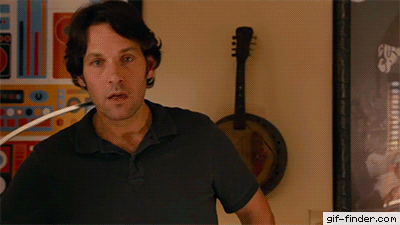My parasocial journey with Paul probably started innocently enough with Clueless and then sat around dormant for years. After reviewing his IMDB, it turns out I’ve seen more of his movies than I would've thought (Role Models!, I Love You, Man!). I think the whole thing snuck up on me though. I’m as amused and charmed by him as I would be seeing a dear friend join a hippie cult, or explore the sadness and hijinks of middle age. I’m inordinately pleased by his SNL, Funny or Die and Tim & Eric skits, not to mention his turn as Mike Hannigan on Friends (the mere thought of which has me laughing out loud as I write this…seriously, what’s wrong with me?). I'm even drawn to him when he isn’t being totally hilarious, when he's giving advice to teenage girls or hanging out in a closet with some guy. I can only credit the strength of my mostly reasonable intellect with just barely overriding the warm feelings I experience when I see him acting like someone's idiot brother, or posing in jokingly seductive photo shoots. And if I’d known he was in a Broadway play, well, I might have tried to figure out a way to see that.
Countless PhD students have written their dissertations on the phenomenon of parasocial relationships and I’m embarrassed to say apparently I’m a textbook case. The formation of these bonds has to do with factors too varied and complex to fully explore here. These include how many hours are spent viewing, the comfort of the celebrity’s persona and their assimilation into our lives through their work and general cultural presence. There are myriad film and television techniques that create bonds without us even noticing. How unusual and intimate to spend so many hours staring at someone's face, from this angle and that, without ever looking away as we would in real life. The constant casual discussion of celebrities is a shorthand that increases feelings of familiarity too. I've been talking to people about Paul Rudd for the last few days because of this article, and when he appeared on the Oscar's Sunday night, I nearly lost it. The beard! The rumpled tuxedo! What's my friend doing at the Oscar's?
This isn’t my dissertation, but it’s safe to say things are getting a bit pathological if you think the soap star playing the doctor can give you medical advice or that no real man will ever live up to the one in the romantic comedy (and people do take it that far). But it’s also safe to say that most of us operate somewhere more reasonable, but definitely somewhere, within this spectrum of one-sided familiarity. These confusions are perhaps unavoidable, not so much a sign of one person’s fragile, overactive psyche as they are a by-product of being inundated and compelled by stories that are so often creating idealized, relatable, or serialized worlds.
In an informal and unscientifically conducted poll I’ve encountered the following data:
-Someone who is mad at Justin Bieber for how it all went down with Selena Gomez.
-Someone who thinks she might have been the one who could’ve given the right sort of tough love to Jack Kerouac.
-Someone drawn to spies who know how to feign weakness but ultimately triumph.
-Someone who became an extra in a James Franco film because she felt sure they’d have a connection.
-Someone sure that she and Mindy Kaling would have an amazing time hanging out.

So Paul and I are not the only ones who have this intimacy at a distance, which makes me feel better. Our parasocial relationships speak to the qualities in others that appeal and resonate in revealing ways. We form impressions of celebrities like we do with anyone else. Empathy plays an interesting role in these relationships too, with those of us who display stronger feelings of empathy often creating stronger parasocial bonds as well. Empathy is what truly involves us in stories, and in the lives of other people, fictional and not. So it makes sense that the inclination toward parasocial connection actually makes stories better, more urgent and more engaging. On a fundamental level we care more when we're connected more and vice versa. It’s an intriguing and particular human tendency to identify so strongly with what we see in these total strangers and the stories around them. We entangle ourselves, emotionally and psychologically, in our attraction and identification, in our desire to relate and empathize.
http://www.funnyordie.com/videos/626177adb2/paul-rudd-pitches-harvey-weinstein
The notion of the parasocial suggests that people are not just passive viewers. We really do seek out what speaks to us, yet we also have a profound inability and unwillingness to acknowledge the media's influence on us at the same time. I definitely feel that duality. I tell people about my BFF Paul Rudd with high levels of self-deprecation, irony and disclaimers. Because it doesn’t count if I’m aware of it, right? But it also happened without me being aware of it. And at the end of the day, I really do feel it. That’s the confession, the psychology, the fascination.




